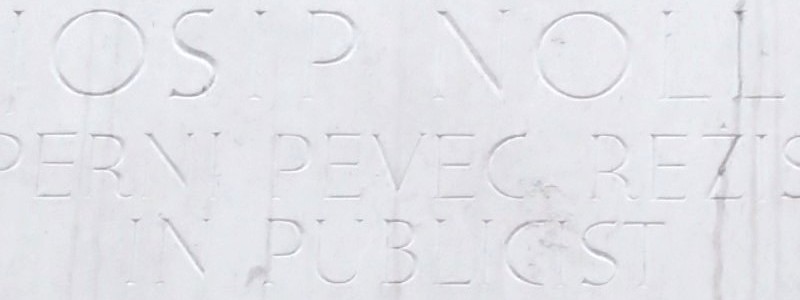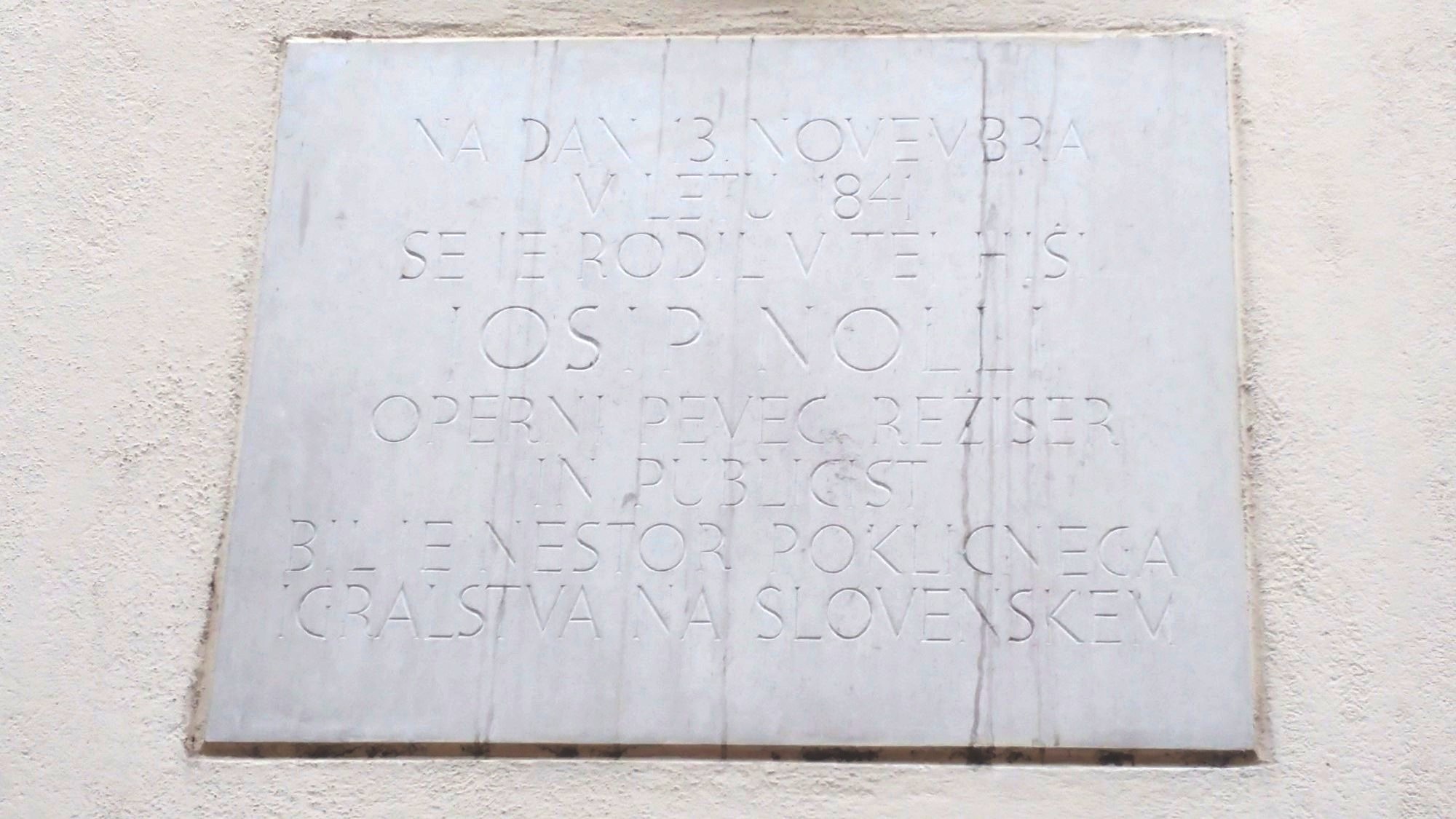The commemorative plaque dedicated to Josip Nolli marks the place of his birth. The two-storey corner house is adorned by a three-axial Baroque façade and a plaque with a timeworn inscription that reads, “On the day of 13 November in the year of 1841, Josip Nolli, an opera singer, director and publicist, was born in this house. He was the doyen of professional acting in Slovenia.”
Josip Nolli
Opera singer, actor, director and publicist Josip Nolli (1841–1902) first rose to international prominence and subsequently also gained renown in the national theatre arena. One of the pivotal figures of nineteenth-century Slovenian theatre, this stellar soloist proved highly influential in promoting the emergence and development of musical theatre.
After obtaining a secondary education in Ljubljana, Nolli studied law in Vienna, where he completed his studies, but did not take the state examination. Soon abandoning the legal profession, Nolli focused his creative energies on working in Slovenian dramatic arts, achieving distinction as a theatre practitioner, director and founder of the Dramatic Society. He contributed to the theatre performances of the National Reading Room in Ljubljana, and directed 160 performances, including 30 operettas and singspiels, during his first Ljubljana period.
In 1866, he co-founded the Dramatic Society and helped define its mission, becoming its first secretary. He took part in the Society’s performances as a singer, actor and director, and also devoted himself to teaching (he was on the faculty at the drama school between 1870 and 1871).
Writer Fran Levstik, who formed an unfavourable opinion of Nolli’s activity in the Dramatic Society, relieved Nolli of his duties in 1868 and reorganised the Society. Nevertheless, Nolli afterwards succeeded in regaining his position, and as its secretary ardently advocated plays by Slavic authors; it was through his efforts that by 1875 the theatres of Ljubljana had embraced a repertoire of Bohemian works. He then went on to assert himself as an operatic baritone soloist in Zagreb.
He joined the Slovenian tenor Fran Gerbič as a member of the Zagreb Opera House and concurrently studied in Italy under the eminent singing teacher Alberto Giovannini. Throughout the fifteen years of his international singing career Nolli performed at a range of venues in Bohemia, Greece, Italy and Spain, and as a popular and compelling baritone drew particular praise in Italian operatic roles.
Returning to Ljubljana in 1890, Nolli re-asserted himself as a theatre practitioner, opera singer and publicist and was appointed editor of Slovenski narod (Slovenian Nation), a journal he contributed to throughout the years of his international singing career.
On the occasion of the opening of the new Opera House, the Board of the Dramatic Society welcomed Nolli back into their midst. He served as the right-hand man of the principal of Glasbena matica Music School and conductor, Fran Gerbič, and directed performances at the Ljubljana Opera. In 1892, Nolli and Gerbič inaugurated the new opera venue by premiering Teharski plemiči (The Noblemen of Teharje) by Benjamin Ipavec, which was followed by a period of richly varied repertoire of new contemporary opera works, including Cavalleria rusticana by Pietro Mascagni and Wagner’s Lohengrin, Tannhäuser, and Der fliegende Holländer, which was produced in Slovenian for the first time.
Nolli was instrumental in discerning the requirements of Slovenian theatre with his keen insight into domestic concerns. A man of vast experience in the field, he identified the reasons for the sluggish Slovenian theatre scene and attributed them to the general lack of knowledge about the principles of theatre and understanding of its creative processes. He addressed the problem by producing a manual for theatre non-professionals or ‘dilettantes’, adapted and partially translated from the popular Bohemian original authored by his acquaintance, Josef Mikuláš Boleslavsky. By launching the first manual of its kind in Slovenia, Nolli aimed to offer theatre practitioners an overview of the basic guidelines of theatre techniques, an introduction to the processes of the craft, and foster appreciation of the art of theatre. Apart from its pedagogical relevance, the manual is an historical testimony to Slovenia’s strengthening ties of friendship with Bohemia and interest in its culture in the 19th century.
Alongside Fran Gerbič and Matej Hubad, Nolli is one of the three most prominent Slovenian exponents of theatre music, a musical genre that in nineteenth-century Slovenia had only just started to gather momentum.
Maia Juvanc

